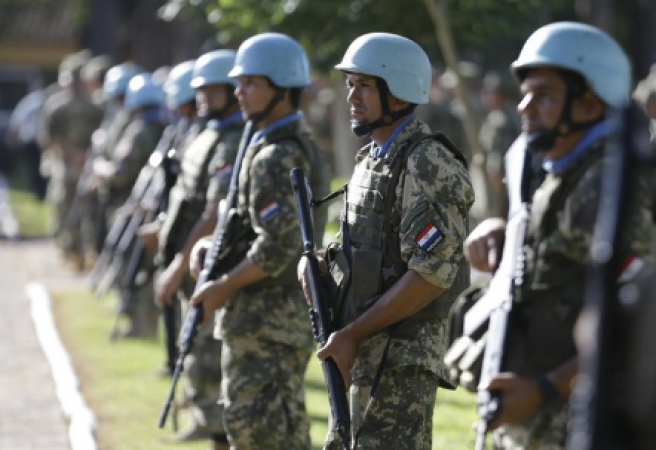
UNO: More than 2 million peacekeepers have been dispatched by the UN over the past 75 years to assist nations in resolving conflicts, with notable successes in Liberia and Cambodia and grave failures in the former Yugoslavia and Rwanda.
These include more violent environments, fake news campaigns, and a divided world that are impeding its ultimate goal: successfully restoring stable governments. It now faces new challenges in the dozen hotspots where UN peacekeeping has operations.
On Thursday, the organisation commemorated the International Day of United Nations Peacekeepers and the 75th anniversary of UN peacekeeping with a solemn ceremony in memory of the more than 4,200 peacekeepers who have lost their lives since 1948, when the UN Security Council made the historic decision to dispatch military observers to the Middle East to monitor the implementation of Israeli-Arab armistice agreements. Ambassadors from the 39 home nations of the 103 peacekeepers who were added to the list in 2022 accepted medals on their behalf.
Also Read: Neuralink has received FDA approval to study human brain implants
At the ceremony, hundreds of uniformed military officers and diplomats were asked to stand for a moment of silence in memory of the victims. This request came from UN Secretary-General Antonio Guterres. And before a UN Security Council discussion on maintaining peace in Africa began, everyone in the room stood in silent remembrance of the fallen peacekeepers.
After placing a wreath at the Peacekeepers Memorial, the secretary-general said that what started out in the Middle East "as a bold experiment" 75 years ago "is now a flagship enterprise of our organisation." He claimed that peacekeepers serve as "a beacon of hope and protection" for civilians caught up in armed conflict.
UN peacekeeping efforts have significantly expanded. There were 11,000 UN peacekeepers on the ground at the end of the Cold War in the early 1990s. There were 130,000 in 16 distant peacekeeping operations as of 2014. Currently, 12 conflict zones in Africa, Asia, Europe, and the Middle East are home to 87,000 men and women.
Also Read: After 33 years in a California prison a man was found not guilty of an attempted murder
According to UN peacekeeping chief Jean-Pierre Lacroix in an interview with The Associated Press on Wednesday, there have been two different kinds of successes. There is a long list of nations that have experienced a resurgence of stability thanks to UN peacekeeping, including Liberia, Sierra Leone, the Ivory Coast, Mozambique, Angola, and Cambodia. There are also nations where peacekeepers are not only monitoring cease-fires but also defending them, such as southern Lebanon and Cyprus.
As examples of failures, he cited the UN peacekeepers' inability to stop the 1994 genocide in Rwanda, which resulted in the deaths of at least 800,000 ethnic Tutsis and Hutus, and the 1995 massacre at Srebrenica, which resulted in the deaths of at least 8,000 mostly Muslim men and boys and was the only acknowledged genocide in Europe since the Holocaust of World War II.
Numerous claims that peacekeepers tasked with protecting civilians sexually assaulted women and children, including in the Central African Republic and Congo, have damaged the UN's reputation. Another well-known error was the outbreak of cholera in Haiti in 2010, which was caused by UN peacekeepers accidentally introducing the bacteria into the nation's largest river through sewage runoff from their base.
The UN director for the International Crisis Group, Richard Gowan, nonetheless noted that "UN peacekeeping has a surprisingly decent track record."
He asserted that, despite the understandable attention paid to the disasters in Rwanda and Srebrenica, "the UN has done a good job of tamping down crises, protecting civilians, and rebuilding broken states in cases from the Suez crisis in the 1950s to Liberia in the 2000s."
Looking ahead, Lacroix of the UN stated that the main obstacle to peacekeeping is the divided nature of the international community, particularly within the UN Security Council, which must approve its missions.
We are unable to deploy, support a political process that advances, and then gradually wind down when that political process is finished, which is what he refers to as the ultimate goal of peacekeeping, he said. We are unable to do that because the pace of the peace processes is too slow.
Consequently, "we basically have to be satisfied with what I call the intermediate goal of peacekeeping — maintaining cease-fires, protecting civilians, we protect hundreds of thousands of them... and, of course, doing everything in our power to assist political initiatives wherever we can," said the undersecretary-general for peace operations.
Lacroix mentioned additional difficulties that peacekeepers face, including an environment that is more violent and dangerous and more sophisticated attacks. Disinformation and fake news "is a massive threat to the population and the peacekeepers."
Old and new sources of conflict, such as transnational crime, drug trafficking, the proliferation of weapons, illegal exploitation of natural resources, and the impact of climate change escalating rivalry between herders and farmers, are all exerting "absolutely massive influence."
He asserted that the UN must do a better job of handling every problem. Additionally, it must carry out its performance-related initiatives, combat fake news, enhance safety and security, and recruit more women to serve as peacekeepers in order to continue increasing the effectiveness of peacekeeping.
Also Read: A US Navy investigation reveals serious issues with SEAL training
According to Gowan of The Crisis Group, it is pretty obvious that the UN is "trapped" in places like Mali and the Congo where there aren't enough peacekeepers to stop violent cycles from repeating. He claimed that some African governments, like the one in Mali, are using private security companies like Russia's Wagner Group to combat insurgents.
Gowan said, "I think we should be cautious about completely ending UN operations. "In situations like Afghanistan, we have discovered the hard way that even powerful Western forces cannot impose peace. Nobody is significantly more effective at fostering stability in unstable states than the UN, despite its less than ideal track record.